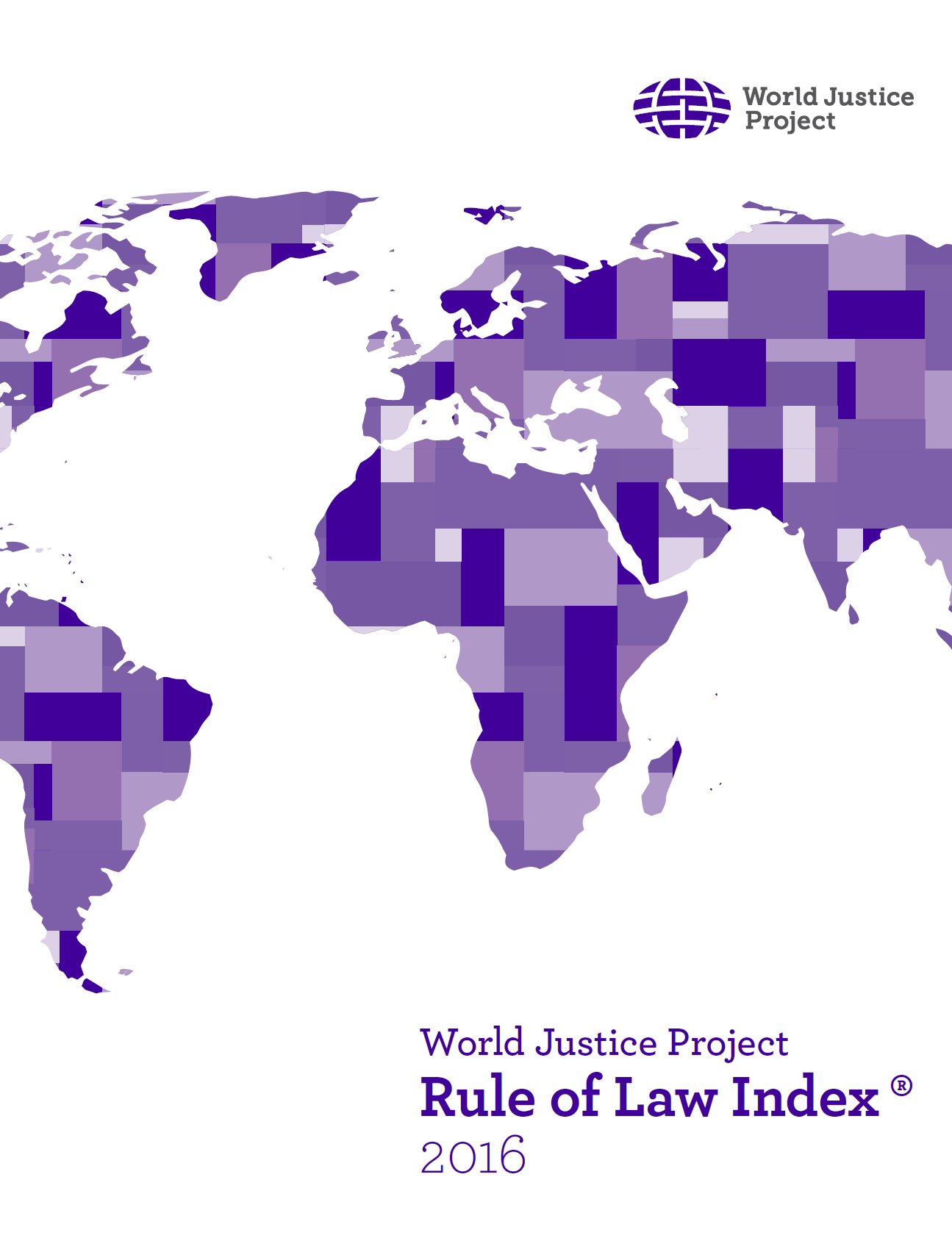
Rule of Law Index 2016
Publication Year: 2016 / Sources: World Justice Project (WJP)The Rule of Law Index 2016 was prepared by The World Justice Project (WJP)’s research team. This research has measured on 9 factors: constraints on government powers, absence of corruption, open government, fundamental rights, order and security, regulatory enforcement, civil justice, and criminal justice. A ninth factor, informal justice, is measured but not included in aggregated scores and rankings. These factors are intended to reflect how people experience rule of law in everyday life. This WJP Rule of Law Index 2016 are derived from more than 110,000 households and 2,700 expert surveys in 113 countries and jurisdictions. The reports showed that Cambodia ranked 112 out of 113 countries and dead last in the East Asia and Pacific region. Of the 15 countries surveyed from the East Asia and Pacific region, Cambodia scored lowest and New Zealand highest, with countries like Mongolia and Malaysia falling somewhere in between. Among all 113 countries rated worldwide, Cambodia came in 112, scoring just below Afghanistan and above only Venezuela, a country experiencing food shortages and frequent violence. Cambodia dropped two points in the ranking since last year’s report.
Download: English | Khmer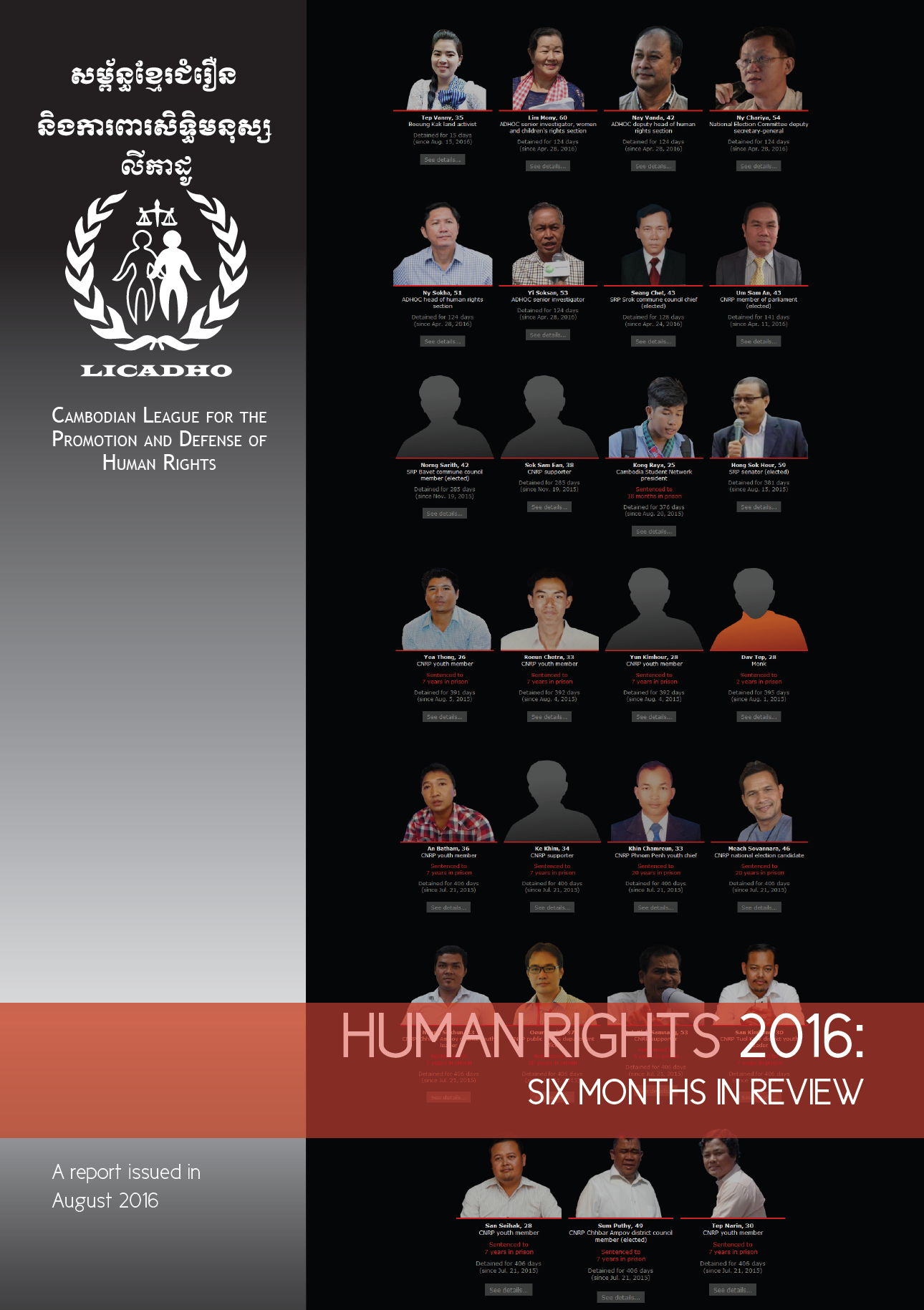
Human Rights 2016: Six Months in Review
Publication Year: August 2016 / Sources: LICADHOThis is the Human Rights Report in 2016 within first six months monitored by LICADHO.
Download: English | Khmer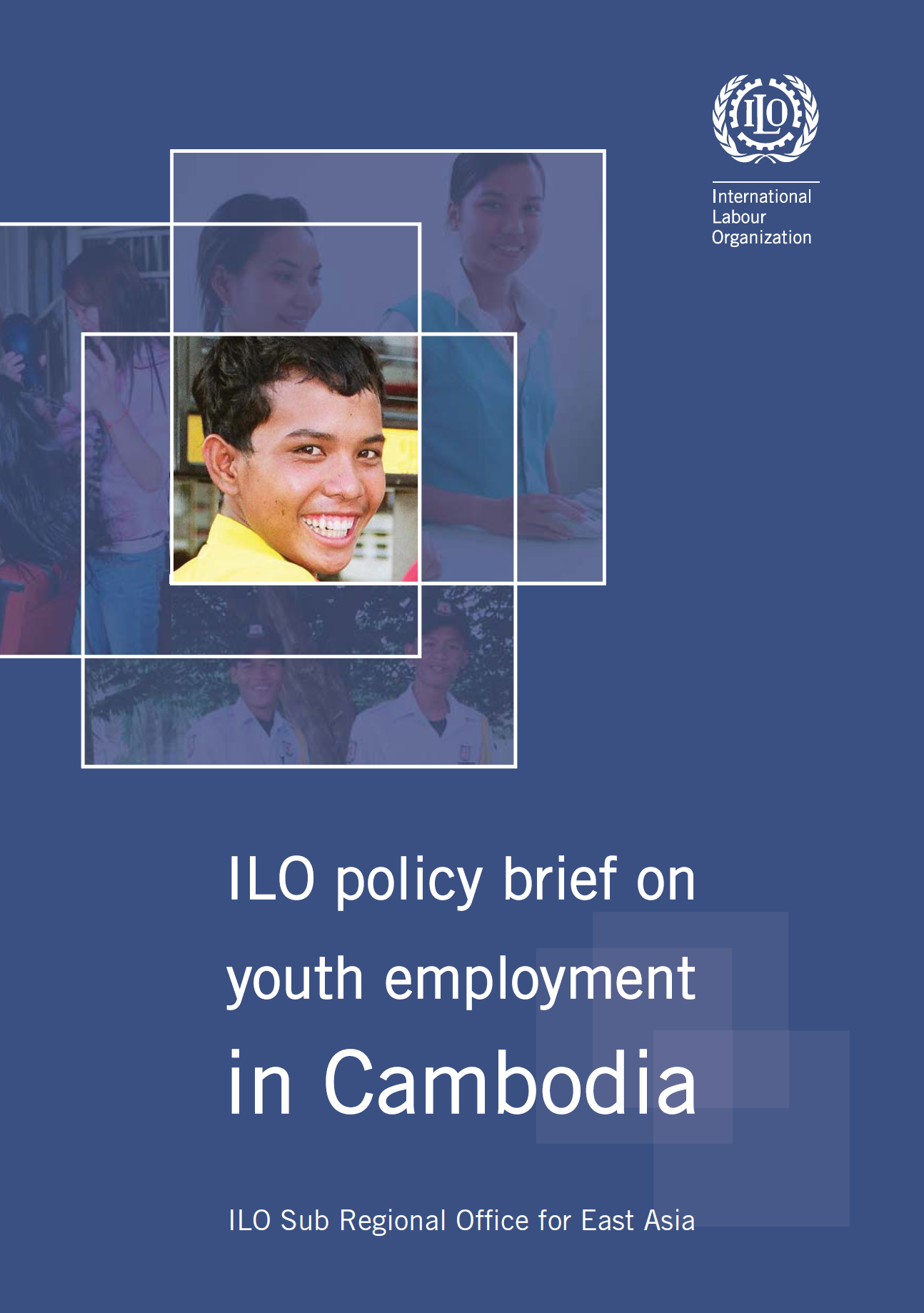
ILO Policy Brief on Youth Employment in Cambodia
Publication Year: 2007 / Sources: International Labor Organization (ILO)Cambodia has a young population with 39 per cent of the population in 2004 below 15 years of age, down from 43 per cent in 1998. By 2004 the dependency ratio showing the children and elderly as a percentage of the intermediate group was 74 per cent.1 Youth aged 15–24 represented 22 percent of the population that year. Large numbers of young people are entering
the labour force as a result of a baby boom in the 1980s. Measures must be taken to ensure that youth do not add to underemployment in the countryside or lead to higher rates of urban unemployment but instead contribute to growth and development through productive employment.
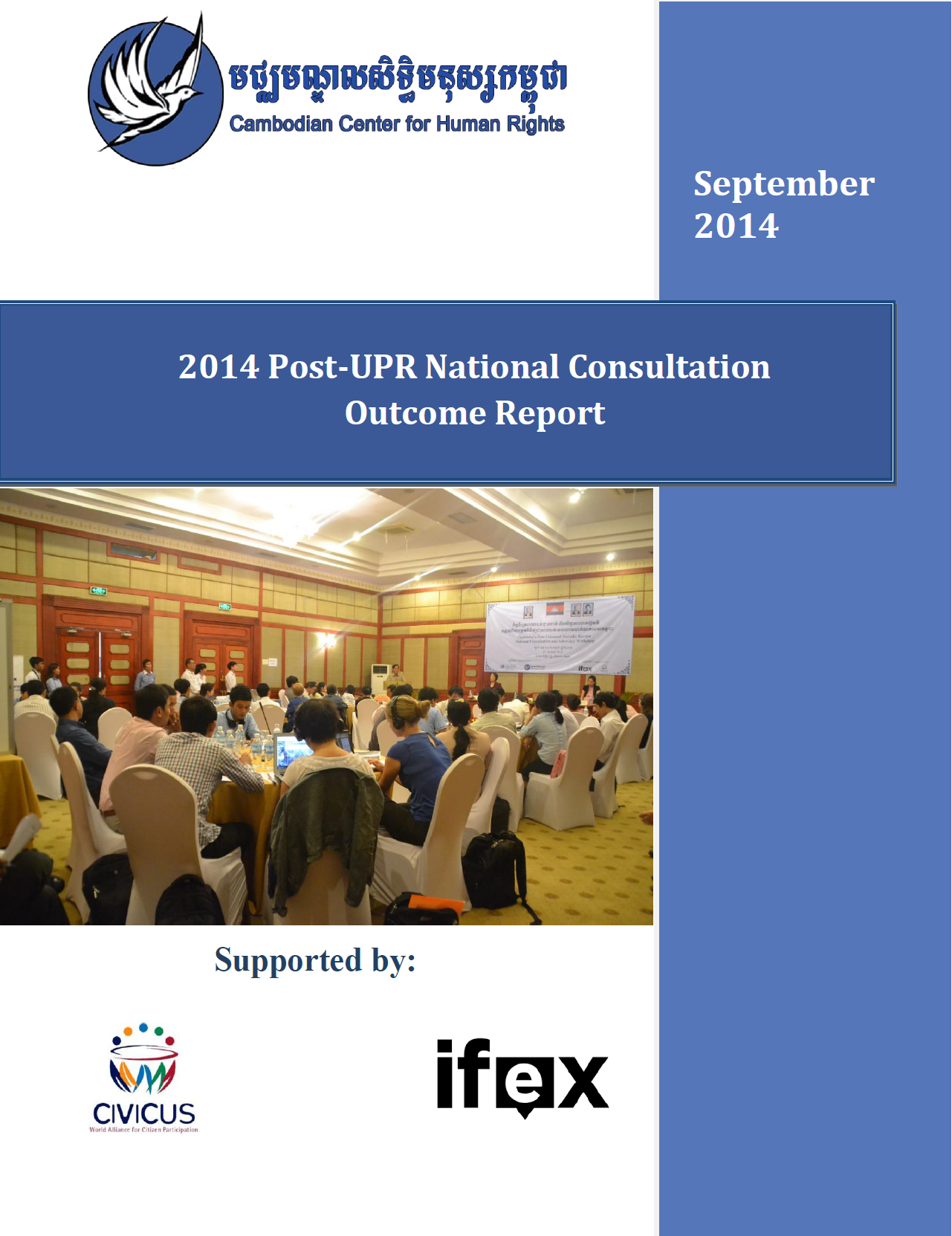
2014 Post-UPR National Consultation Outcome Report
Publication Year: 2014 / Sources: Cambodian Center for Human Rights (CCHR)This Outcome Report summarizes presentations, panel discussions and small group discussions undertaken during the 2014 Post-Universal Periodic Review National Consultation organized by CCHR and the Office of the United Nations High Commissioner for Human Rights (“OHCHR”) in Cambodia.
Download: English | Khmer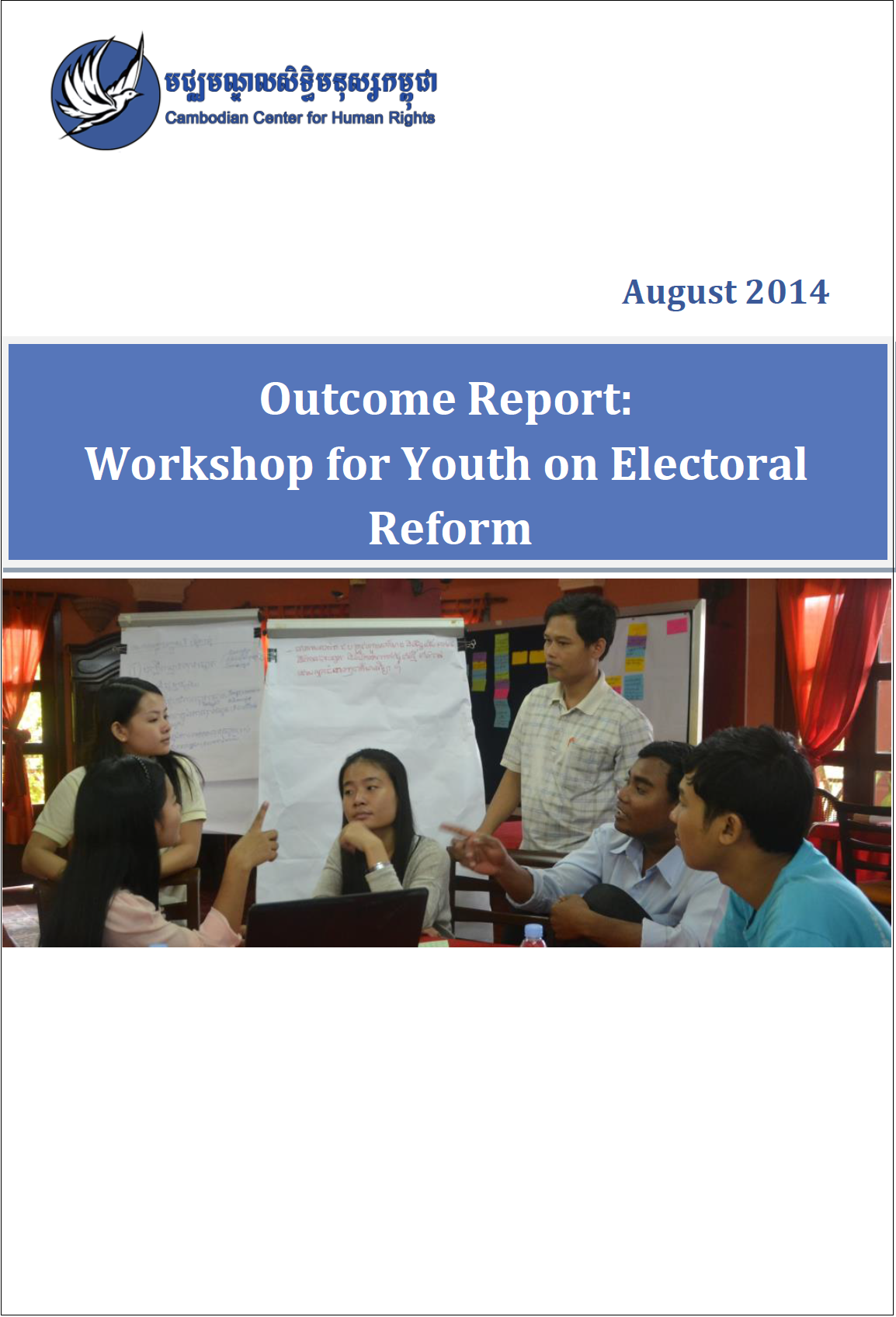
Outcome Report: Workshop for Youth on Electoral Reform
Publication Year: 2014 / Sources: Cambodian Center for Human Rights (CCHR)This report summarizes the issues raised and recommendations of participants during the Workshop for Youth on Electoral Reform. The objectives of this event was to provide opportunities for youth participants to identify key concerns regarding electoral reform and to develop recommendations, in addition to learning about substantive issues regarding to political participation and electoral reform.
Download: English | Khmer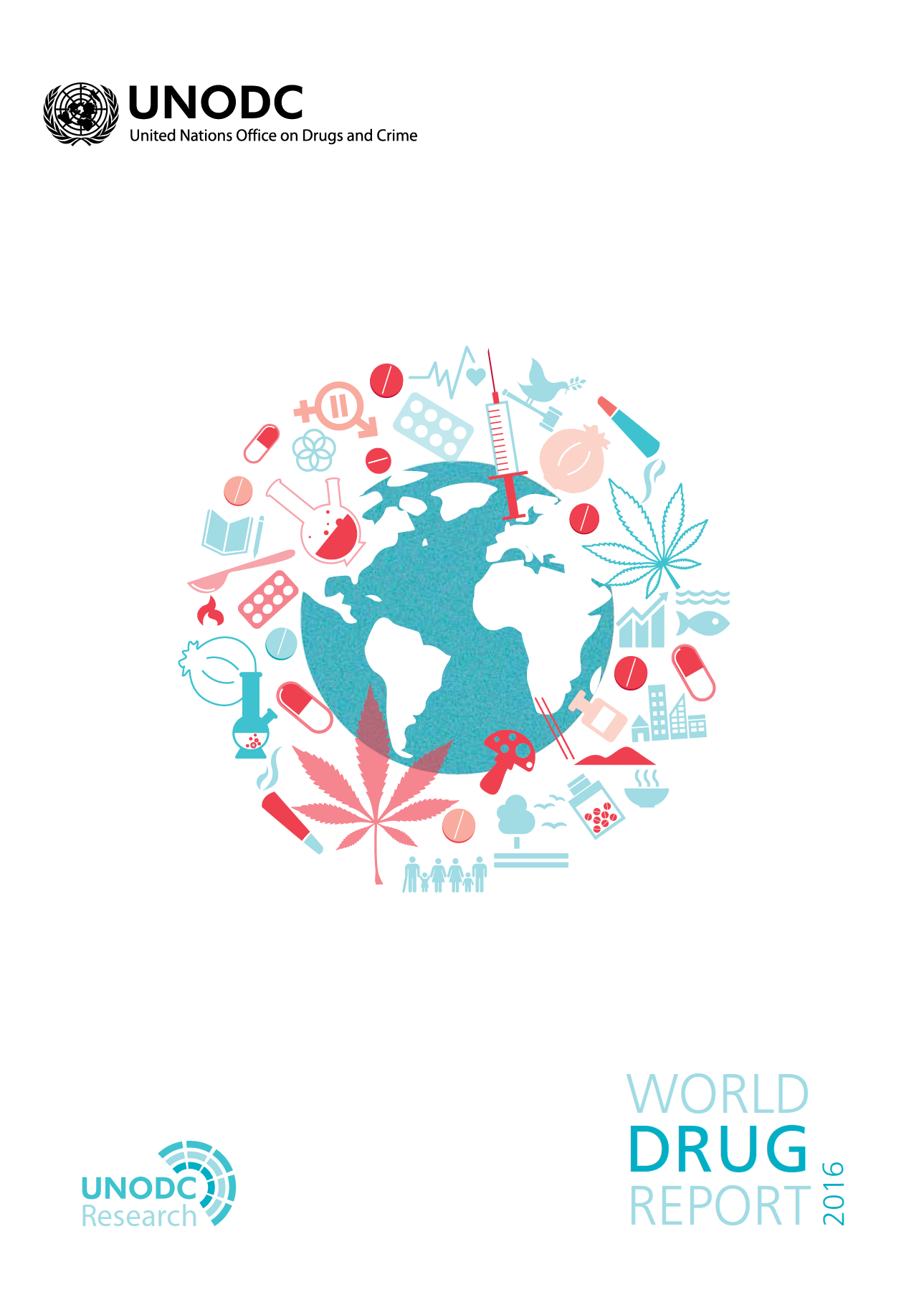
World Drug Report 2016
Publication Year: 2016 / Sources: UNODCThe World Drug Report 2016, which provides a comprehensive overview of major developments in drug markets, trafficking routes and the health impact of drug use, supports comprehensive, balanced and integrated rights-based approaches. The text highlights the importance of drug abuse prevention and treatment; encourages the development, adoption and implementation of alternative or additional measures with regard to conviction or punishment; and promotes
proportionate national sentencing policies, practices and guidelines for drug-related offences.

Skin on the Cable: The Illegal Arrest, Arbitrary Detention and Torture of People who use Drugs in Cambodia
Publication Year: 2010 / Sources: Human Rights Watch“Skin on the Cable”
The Illegal Arrest, Arbitrary Detention and Torture of People Who Use Drugs in Cambodia
Cambodians who use drugs confound the notion that drug dependence is a self-inflicted condition that results from a character disorder or moral failing. When Human Rights Watch talked with these people, they were invariably softly spoken and polite. They talked openly and honestly about difficult childhoods (in many cases still underway) living on the streets, or growing up in refugee camps in Thailand. Often young and poorly educated, they spoke of using drugs for extended periods of time. Despite many hardships in their lives, their voices rarely became bitter except when describing their arrest and detention in government drug detention centers. They did not mince words when describing these places. One former detainee, Kakada, was particularly succinct: “I think this is not a rehab center but a torturing center.
Download: English | Khmer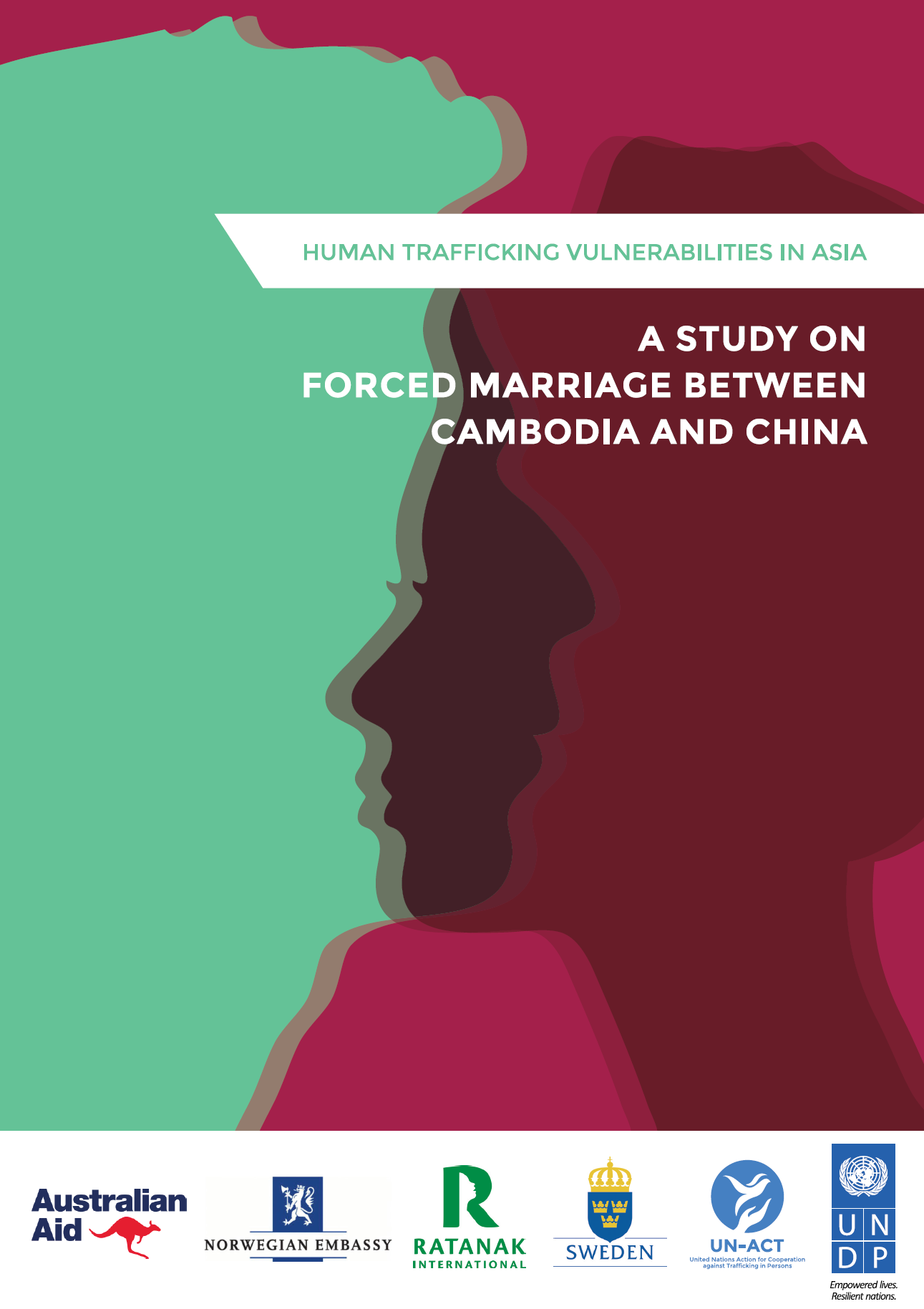
Human Trafficking Vulnerabilities in ASIA: A Study on Forced Marriage Between Cambodia and China
Publication Year: 2016 / Sources: United Nations Action for Cooperation against Trafficking in Persons (UN-ACT)Human Trafficking Vulnerabilities in ASIA:
A Study on Forced Marriage Between Cambodia and China
This report examines patterns of forced marriage in the context of broader migratory flows between Cambodia and China. It primarily draws on the accounts of 42 Cambodian women who experienced conditions of forced marriage, with interviews having taken place in both countries. Key informants from government and non-government stakeholders in Cambodia and China were consulted as well.
The objective has been to analyze recruitment, brokering, transportation and exploitation patterns as well as the links between these; to determine service needs amongst Cambodians trafficked to China for forced marriage, in China, during the repatriation process and upon return to Cambodia; as well as to identify opportunities for interventions to prevent forced marriages from occurring and to extend protective services to those in need, at both policy and programming levels.
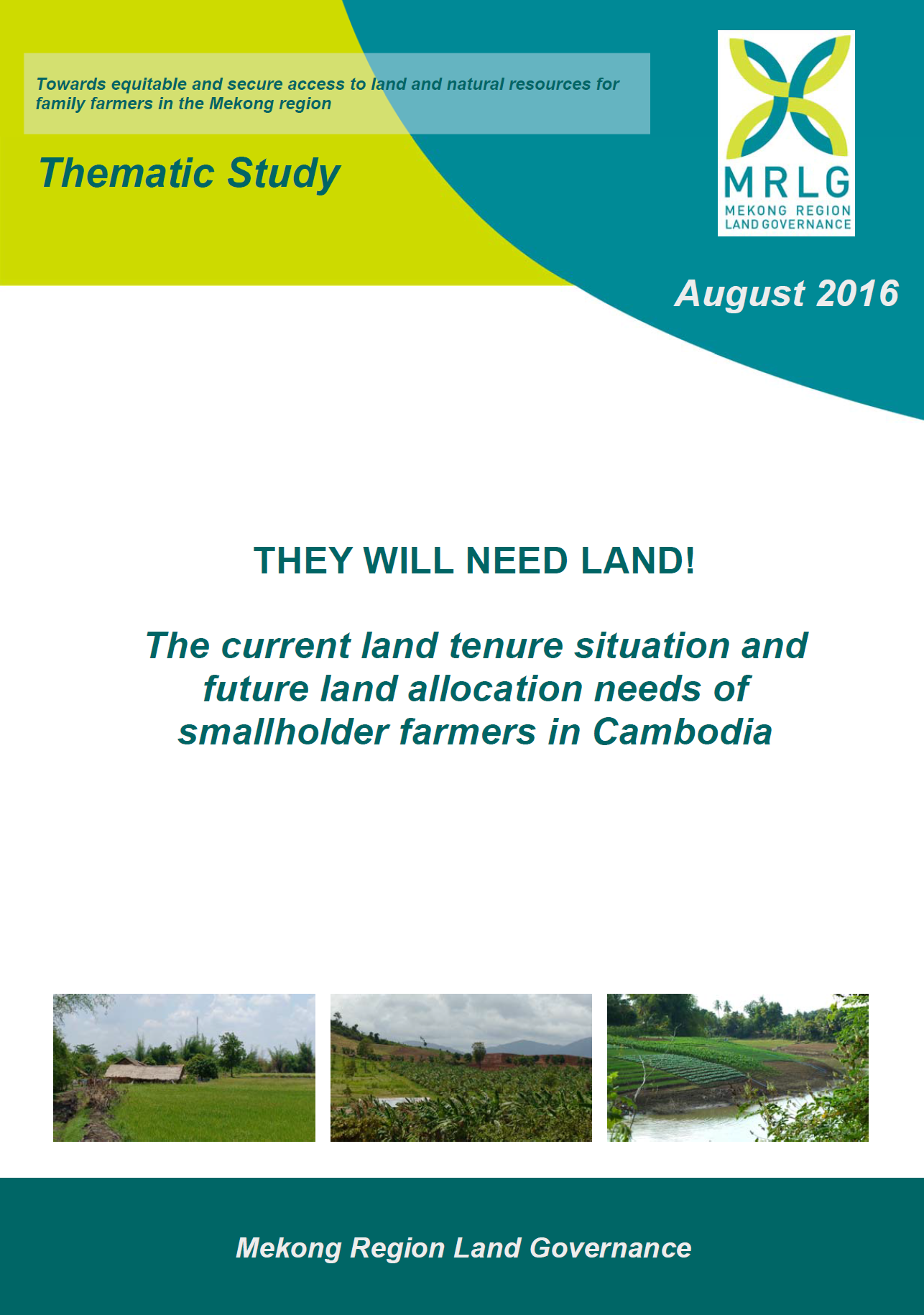
They Will Need Land!
Publication Year: 2016 / Sources: Jean-Christophe, Mekong Region Land GovernanceThey Will Need Land!
The current land tenure situation and future land allocation needs of smallholder farmers in Cambodia
The objective of this background paper is to provide a succinct description of the land tenure situation in Cambodia and, on that basis, discuss the needs smallholder farmers have for land, projected up to the year 2030. The main problem it examines lies at the intersection between, on one hand, the demographic increase in the rural smallholder population and its associated need for land in the future (the demand side) and, on the other hand, the possibility offered by the different land tenure regimes to meet this demand (the supply side); the central question focuses on how supply can meet demand.
Download: English | Khmer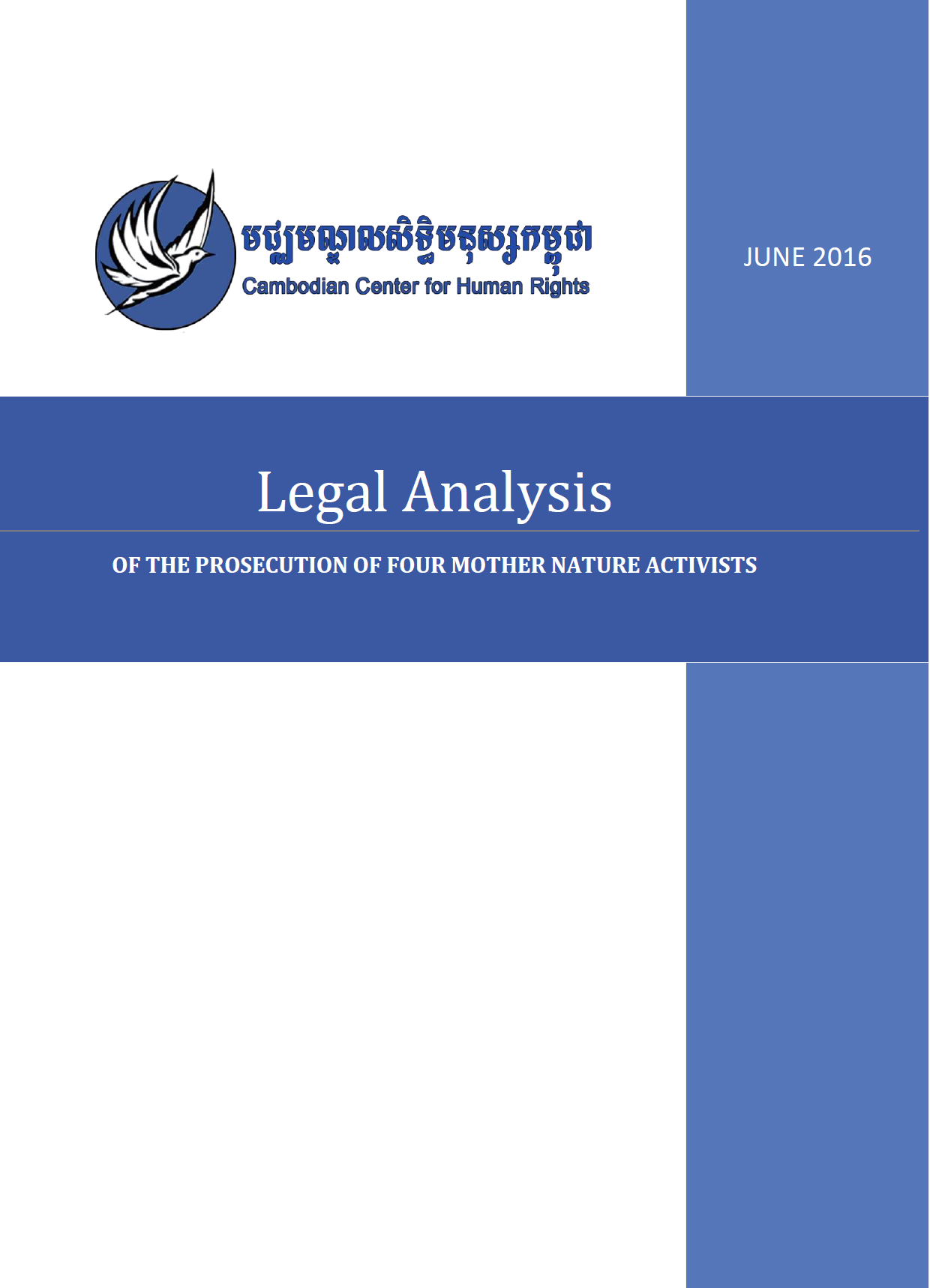
Legal Analysis of The Prosecution of Four Mother Nature Activists
Publication Year: 2016 / Sources: Cambodian Center for Human Rights (CCHR)Legal Analysis aims to examine whether the charging of the four charged persons, along with the lengthy pre-trial detention ofthe three detainees, is reasonable and sufficiently supported by the available evidence. This Legal Analysis:
1. Provides factualcontext and background for the case
2. Introduces the facts of the case, the charges against all four charged persons, thedetention of three of the charged persons, and the enforced exile of Alejandro Gonzalez-Davidson from Cambodia
3. Providesan overview of the applicable domestic law and binding international human rights standards
4. Conducts an analysis of thecharges and applies the law to the reported facts
5. Explores a number of related legal issues, including Alejandro Gonzalez-Davidson’s right to be present at his trial, and the legality of the prolonged pre-trial detention of the other three detainees
6. Concludes that the prolonged pre-trial detention of the three activists is arbitrary, the accessory offense is inappropriate inrelation to Alejandro Gonzalez-Davidson, and the charge against the three detained charged persons is unfounded due to thelack of evidence against those charged.
